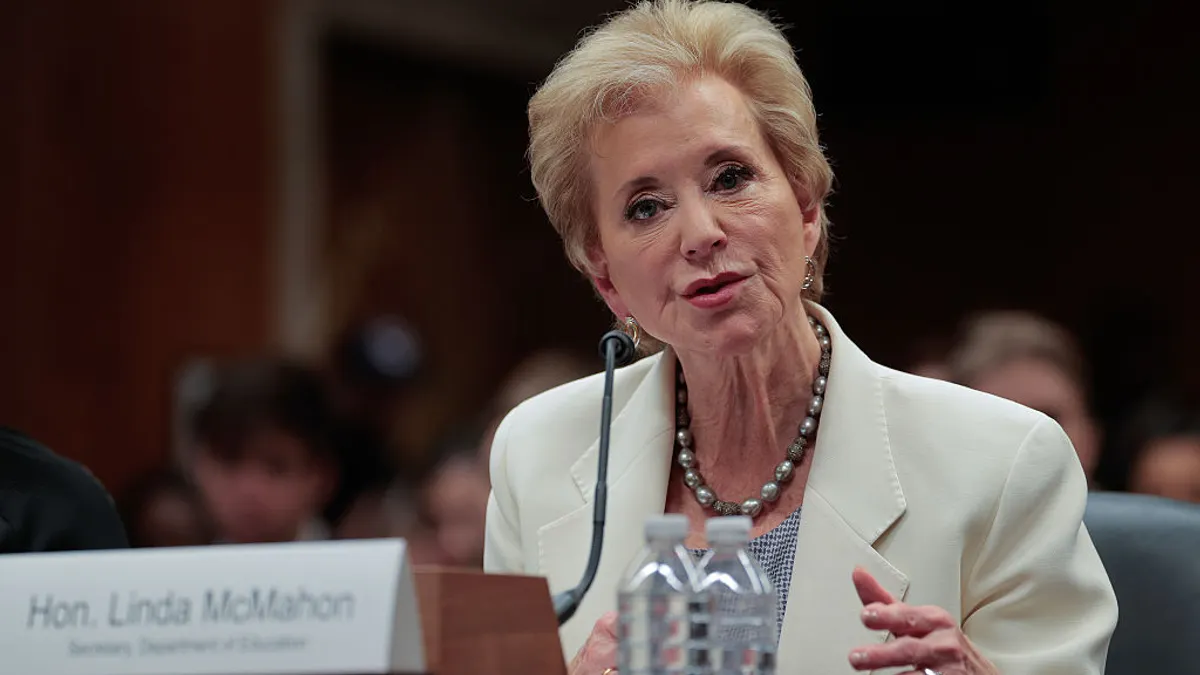Dive Brief:
- JPMorgan Chase Bank filed a lawsuit last month against the founder of an ed tech firm, alleging that she artificially inflated user numbers in order to convince the financial institution to purchase her company for $175 million.
- The lawsuit targets Charlie Javice — the founder of Frank, a platform that helps prospective college students apply for federal financial aid — as well as the company’s former chief growth officer, Olivier Amar. It alleges that Javice and Amar used fake data to convince Chase that the Frank app had nearly 4.3 million users even though it had fewer than 300,000 customer accounts.
- The fake data was key in convincing Chase to acquire the company in 2021, bringing on Javice and Amar as employees in the process. The lawsuit, filed in a federal district court in Delaware, alleges that the duo committed fraud and violated federal securities laws.
Dive Insight:
The lawsuit raises serious questions about the underlying business of Frank, once an ed tech darling that TechCrunch described as “akin to TurboTax for college money.” The platform was intended to simplify the process of applying for the Free Application for Federal Student Aid, or FAFSA, as well as offer help finding scholarships and college courses.
In 2020, Frank raised $5 million, including from public ed tech giant Chegg. That followed two other funding rounds in 2017 that collectively raised $15.5 million.
Frank executives approached Chase in 2021 about exploring a potential acquisition, according to the lawsuit. During a meeting in July of that year, Javice told Chase officials that the platform had nearly 4.3 million users, which she defined as those who created an account on the website with their full name, email and phone number.
Chase was interested in buying the platform because it offered access to college-aged students, a market in which the financial services company was looking to grow. However, the company later learned that Frank executives worked with a university professor to pad the user database with fake student information and then bought data from two firms to cover their tracks after the acquisition, according to the lawsuit.
The scheme allegedly began when Chase officials asked Frank executives for a list of the platform’s customer accounts to verify the 4.3 million users count before they went forward with the acquisition, according to the complaint. It says Javice and Amar originally asked Frank’s engineering director to augment the user list with computer-generated information, assuring him that doing so was not illegal.
“The Frank engineer was not persuaded and declined to participate in the scheme, and instead said that he only would provide Javice with Frank’s actual list of customer accounts: fewer than 300,000 customer accounts as of July 31, 2021,” the complaint states.
Javice then enlisted the help of a data science professor to use “synthetic data” techniques to create 4.3 million customer names with matching email addresses, birthdays and other personal information, according to the lawsuit. Frank executives paid the professor $18,000 for his work, asking him to create an invoice with a generic line item for “data analysis.”
However, email exchanges between Javice and the professor reveal that these techniques were merely a vehicle to create fraudulent student data, the lawsuit alleges. The lawsuit does not name the professor or his institutional affiliation.
Meanwhile, Amar purchased a list of 4.5 million real college students and their data from ASL Marketing for $105,000. Frank executives later supplemented that list — which only had email addresses for a portion of the students — by purchasing more data from an information services company.
The acquisition closed in September 2021. Javice received roughly $9.7 million from the transaction, while Amar received about $5 million. Both became Chase employees following the deal.
Shortly afterward, the lawsuit says the fraud was revealed when Chase’s marketing team asked for the student data for an email campaign to test the quality of the user data. Frank executives supplied the marketing team with the data it had bought instead of the platform’s real user accounts, according to the lawsuit.
“The marketing campaign was a disaster,” the lawsuit says.
Chase reached out to a random sample of 400,000 accounts on the list, but only 103 clicked through to Frank’s website. Moreover, only 28% of the emails were delivered, compared to a 99% delivery rate that Chase sees with similar campaigns.
The company then opened an investigation, resulting in the termination of both Javice and Amar, the lawsuit and the shuttering of the Frank platform.
A lawyer for Javice did not immediately respond to a request for comment Thursday afternoon.
Javice filed her own lawsuit against Chase last month, alleging the company manufactured the investigations into her conduct in order to terminate her and avoid paying her roughly $28 million due from the acquisition, The Wall Street Journal reported.












